|
|
|
Sort Order |
|
|
|
Items / Page
|
|
|
|
|
|
|
| Srl | Item |
| 1 |
ID:
136497


|
|
|
|
|
| Summary/Abstract |
According to Eric Schmidt, Executive Chairman of Google, and Jared Cohen, Director of Google Ideas and an Adjunct Senior Fellow at the Council on Foreign Relations, the Internet is among the few things humans have built that they do not truly under- stand. The Internet is a network of networks, a huge and decentralized web of computer systems designed to transmit information using spe- cific standard protocols. Nations and individuals rely on the Internet on a daily basis to conduct business, connect with friends, and even find love. To state the Internet is an integral part of our way of life is not an overstatement. The Internet allows for friendships, alliances and enmities between states to be extended into the virtual world, adding a new and intriguing dimension to traditional statecraft. As the Chairman of the Joint Chiefs of Staff Army General Martin E. Dempsey stated, “the spread of digital technology has not been without consequence. It has also introduced new dangers to our security and our safety.”1
|
|
|
|
|
|
|
|
|
|
|
|
|
|
|
|
| 2 |
ID:
136434


|
|
|
|
|
| Summary/Abstract |
Since the late 1990s, the Chinese government has engaged in a process of attempting to reform the technical global internet governance regime, which is currently dominated by the US government and non-state actors. This article aims to contribute to the literature on Beijing’s approach to this issue by providing a detailed empirical account of its involvement in a few core regime organisations. It argues that Beijing’s reform approach is guided by its domestically derived preferences for strong state authority and expanding China’s global power, but that its reform efforts are unlikely to succeed based on countervailing structural hard- and soft-power factors.
|
|
|
|
|
|
|
|
|
|
|
|
|
|
|
|
| 3 |
ID:
134969
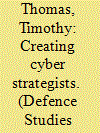

|
|
|
|
|
| Summary/Abstract |
This article offers a straw man cyber curriculum designed to initiate discussion on how to educate cyber strategists in the US, stressing the recent advances in technology moving us to the next generation of wearables, drivables, flyables, and scannables. With everything becoming interconnected, there is a need to extend instruction from the instruments of national power associated with DIME (diplomatic, information, military, economic) to a more holistic paradigm when considering cyber issues. This requires developing cyber strategists based on new curriculum components to capitalize on comprehensive views and analytical thought instead of mnemonic devices. It calls on digital and national security experts to reconsider the underlying concepts that will serve as educational guides for cyber strategists as they progress into the next decade.
|
|
|
|
|
|
|
|
|
|
|
|
|
|
|
|
| 4 |
ID:
136657


|
|
|
|
|
| Summary/Abstract |
India, the IT nation, did not make a news splash at CyberTech 2014. That is worth a passing thought. Because cyber is the fifth and new domain of warfare, after land, sea, air and space.
CyberTech 2014 took place in Tel Aviv in January, and displayed Israel’s prowess in cyber-defence. Israel’s National Cyber Bureau, which played a major role in organising the event, defines its goals as drawing up cyber-defence policies, developing cybersecurity legislation and turning Israel into a global cyber incubator. The Israelis say that as hackers keep getting more sophisticated, the brightest digital security minds from around the world will need to come together. And CyberTech 2014 did do that, bringing together some 500 heads of industry, representatives of cybersecurity agencies from across the world, as well as a large US delegation from the White House and their Department of Homeland Security. Many agreed that Israel’s experience in foiling thousands of cyber-attacks each day and the quality of their cyber start-ups could be very lucrative for business within and outside its
|
|
|
|
|
|
|
|
|
|
|
|
|
|
|
|
| 5 |
ID:
135748
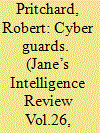

|
|
|
|
|
| Summary/Abstract |
Governments are increasing cyber-warfare, traditionally a private sector-led domain. However as Robert Pritchard assesses, the inherent difficulties of fighting online enemies mean a civilian response may still be the best options
|
|
|
|
|
|
|
|
|
|
|
|
|
|
|
|
| 6 |
ID:
136813


|
|
|
|
|
| Summary/Abstract |
India has to be more vigilant towards its security and strategic assets in the 21st century because this century belongs to ICT (cyber-revolution) like Airplanes in 20th century. Both the century human efforts mould the time space compression; brought some new causality, develop technocratic ability and so on.
|
|
|
|
|
|
|
|
|
|
|
|
|
|
|
|
| 7 |
ID:
136023


|
|
|
|
|
| Summary/Abstract |
Munich based Rohde & Schwarz recently revealed its next generation R&S SDxR family of software transceivers for the tactical domain, highlighting its development direction in the all-important realm of software defined radios.
|
|
|
|
|
|
|
|
|
|
|
|
|
|
|
|
| 8 |
ID:
136778
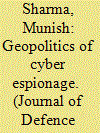

|
|
|
|
|
| Summary/Abstract |
There is an intricate relationship between the methods of cyber espionage and the evolution of information and communications technology, of which information security is a key aspect. This article is an attempt to establish forward and backward linkages of cyber espionage. It examines the geopolitics, methods, role of information security technology and, most importantly, how the future of cyber espionage is being shaped by emerging technologies such as supercomputing, quantum computing and ‘big data’, from an Indian perspective.
|
|
|
|
|
|
|
|
|
|
|
|
|
|
|
|
| 9 |
ID:
136496


|
|
|
|
|
| Summary/Abstract |
In cyberspace attackers enjoy an advantage over defenders, which has popularized the concept of “active cyber defense”— offensive actions intended to punish or deter the adversary. This article argues active cyber defense is not a practical course of action to obtain tactical and strategic objectives. Instead, “aggressive cyber defense,” a proactive security solution, is a more appropriate option
|
|
|
|
|
|
|
|
|
|
|
|
|
|
|
|
| 10 |
ID:
136638


|
|
|
|
|
| Summary/Abstract |
Exaggerated fears about the paralysis of digital infrastructure and the loss of competitive advantage contribute to a spiral of mistrust in U.S.-China relations. In every category of putative Chinese cyber threat, there are also considerable Chinese vulnerabilities and Western advantages. China has inadvertently degraded the economic efficiency of its networks and exposed them to foreign infiltration by prioritizing political information control over technical cyber defense. Although China also actively infiltrates foreign targets, its ability to absorb stolen data is questionable, especially at the most competitive end of the value chain, where the United States dominates. Similarly, China's military cyber capacity cannot live up to its aggressive doctrinal aspirations, even as its efforts to guide national information technology development create vulnerabilities that more experienced U.S. cyber operators can attack. Outmatched by the West, China is resorting to a strategy of international institutional reform, but it benefits too much from multistakeholder governance to pose a credible alternative. A cyber version of the stability-instability paradox constrains the intensity of cyber interaction in the U.S.-China relationship—and in international relations more broadly—even as lesser irritants continue to proliferate.
|
|
|
|
|
|
|
|
|
|
|
|
|
|
|
|
| 11 |
ID:
136909


|
|
|
|
|
| Summary/Abstract |
The authors survey debatable military and political issues raised as warfare has drifted into the electronic domain, far beyond the conventional idea of combat operations.
|
|
|
|
|
|
|
|
|
|
|
|
|
|
|
|
| 12 |
ID:
136432


|
|
|
|
|
| Summary/Abstract |
This article focuses on potential influences of internet use and development on China’s legal system and legal reforms. It examines this issue in both directions: how the Chinese government has been utilising the internet as a tool to strengthen its legal system and fulfil its reform goals, and how the public has responded in both responsive and proactive ways in an interactive and inter-evolving process. While the responsive public participation is answering initiatives from the government in nature, the proactive public participation is self-initiated. In recent years, it is the latter that has carried the greater weight in China’s internet politics. The Chinese government of the future may face challenges as it grapples with the question of how to simultaneously maintain information control while utilising internet technology as a tool to further its reforms.
|
|
|
|
|
|
|
|
|
|
|
|
|
|
|
|
| 13 |
ID:
136028
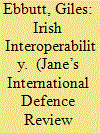

|
|
|
|
|
| Summary/Abstract |
The defence forces Ireland (DFI) officially known as (Oglaidh na Heireann) are in the process of developing a network –enabled capability (NEC), centred on the creation of a joint common operational picture (COP), and with domestic and international interoperability the key requirement. Systematics’ SitaWare command –and control (C2) software suite has been a core ingredient in the process
|
|
|
|
|
|
|
|
|
|
|
|
|
|
|
|
| 14 |
ID:
136433


|
|
|
|
|
| Summary/Abstract |
Taking the approach of surveillance studies, this research aims to advance a balanced and context-rich understanding of how microblogging affords a variety of surveillance practices over Chinese society and of its impact. The study identifies the distinct features of grassroots surveillance, including anti-authoritarism, decentralisation and poor organisation, as well as rumour, entertainment and violence. Grassroots surveillance, enabled by microblogging, poses challenges to state surveillance, which seeks rationality, efficiency, social stability and solidarity. Grassroots surveillance creates huge impacts on Chinese society, including truth, morality, trust and power. The surveillance structure is experiencing a paradigmatic shift from panopticon to post-panopticon. Consequently, this study identifies a bankruptcy of disciplinary society that is based on panopticon surveillance, but without a possible formation of a controlled society that is based on post-panopticon. Instead, the social change enabled by microblogging-based surveillance falls into what Scott Lash called “disorganization”.
|
|
|
|
|
|
|
|
|
|
|
|
|
|
|
|
| 15 |
ID:
135341
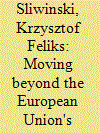

|
|
|
|
|
| Summary/Abstract |
Policy and research on European cyber-security remains formative compared to leaders in the field like China and the United States. This article evaluates the European Union (EU) as a cyber-security actor, asking fundamental questions concerning the EU's combination of prominence and obscurity, especially its limitations and prospects. Who and what is going to dominate the European response to cyber-security in the future? These questions are examined within the larger framework of liberal intergovernmentalism. The EU also is compared to the North Atlantic Treaty Organization (NATO), a point of reference to further understand the limitations and challenges ahead for the EU. Two major factors limit the EU as a cyber-security actor: its intergovernmental character, and the lack of collective vision on cyber-security with the EU and between member states. To play an important role in shaping cyberspace and cyber-security, the EU cannot treat the internet as simply a communication tool or trading platform. Cooperation and capacity-building measures are needed to allow EU member states to surpass mere coordination of their respective national cyber-security strategies. To succeed as a cyber-power, the EU should adapt new and different forms of cyber-power, from the compulsory through the institutional, to the structural and productive. Otherwise, coordination of national strategies for cyber-security of EU member states is the most the EU as an actor can aim for.
|
|
|
|
|
|
|
|
|
|
|
|
|
|
|
|
| 16 |
ID:
135363
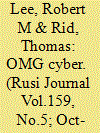

|
|
|
|
|
| Summary/Abstract |
For many austerity-hit Western countries, the defence budget has been a prime target for significant cuts. Nowhere has this been more apparent than in the United States. Yet one element of the Pentagon's budget continues to grow: cyber. High-profile security breaches at the corporate level and reports of cyber-espionage at the national level seemingly justify the vast sums involved in ensuring cyber-security. However, Robert M Lee and Thomas Rid argue that ‘cyber-angst’ is damaging – and self-serving. In this article, they list thirteen reasons why such cyber-security hype is counterproductive.
|
|
|
|
|
|
|
|
|
|
|
|
|
|
|
|
| 17 |
ID:
136347


|
|
|
|
|
| Summary/Abstract |
National constitutions are supposed to enshrine fundamental rights for everyone — and for generations. Such documents are also products of moments in time and reflect perceptions of life in those moments. That’s why the best of them, like the U.S. Constitution, contain the seeds of their own reinvention. Indeed, the secret to a sustainable constitution is that it both captures what is enduring and anticipates the need to change.
|
|
|
|
|
|
|
|
|
|
|
|
|
|
|
|
| 18 |
ID:
136724


|
|
|
|
|
| Summary/Abstract |
DURING THE past few years, if you were one of the many people trawling the dating website OkCupid in search of love, you might have received a notice letting you know it had found someone who was an “exceptionally good” match for you. You might have contacted this match and even gone on dates with this person, comfortable in the knowledge that a sophisticated algorithm had done the difficult work of sorting through millions of profiles to find someone with just the right balance of appealing quirks and concupiscent charms to match your own delightful attributes.
Rosen, Christine
|
|
|
|
|
|
|
|
|
|
|
|
|
|
|
|
| 19 |
ID:
135603


|
|
|
|
|
| Summary/Abstract |
Cyber defence is a critical concern for every government. Surrounded by threats that elude many people, it is imperatives to examine the nature of these dangers and effective response.
|
|
|
|
|
|
|
|
|
|
|
|
|
|
|
|
|
|
|
|
|